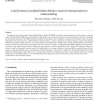45 search results - page 1 / 9 » Applying causal inference to understand emergent behavior |
WSC
2008
13 years 7 months ago
2008
Emergent behaviors in simulations require explanation, so that valid behaviors can be separated from design or coding errors. Validation of emergent behavior requires accumulation...
IUI
2003
ACM
13 years 10 months ago
2003
ACM
We present a probabilistic model, based on Dynamic Decision Networks, to assess user affect from possible causes of emotional arousal. The model relies on the OCC cognitive theory...
PR
2008
13 years 4 months ago
2008
This paper presents a Hierarchical Context Hidden Markov Model (HC-HMM) for behavior understanding from video streams in a nursing center. The proposed HC-HMM infers elderly behav...
MLDM
2009
Springer
13 years 11 months ago
2009
Springer
This work presents an image analysis framework driven by emerging evidence and constrained by the semantics expressed in an ontology. Human perception, apart from visual stimulus a...
HICSS
2003
IEEE
13 years 10 months ago
2003
IEEE
Basically, instrumental conditioning is learning through consequences: Behavior that produces positive results (high “instrumental response”) is reinforced, and that which pro...

